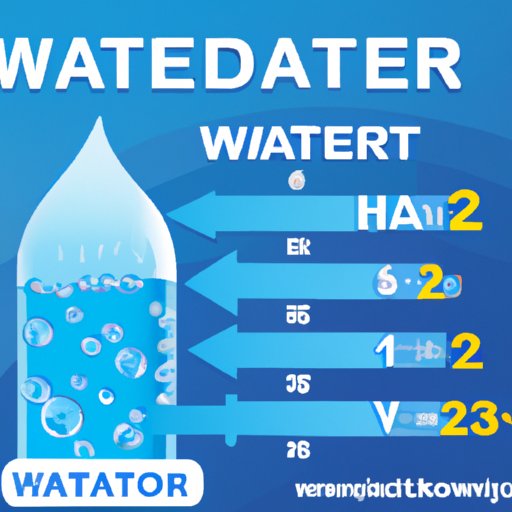Introduction
Hydration is essential for human health. Staying hydrated helps your brain and body function optimally and can even help improve your physical performance. However, many people don’t know how much water they should be drinking each day. In this article, we will explore the basics of hydration, look at recommended hydration guidelines, and discuss how you can calculate your optimal water intake. We will also cover the signs of dehydration and provide tips on increasing your water consumption.
Benefits of Staying Hydrated
Staying hydrated has numerous health benefits. Here are some of the most important:
Improved Physical Performance
Dehydration can lead to reduced physical performance. Studies have shown that even mild dehydration (1-3%) can impair aerobic performance and reduce strength, power, and speed. So if you’re looking to get the most out of your workouts, make sure you’re well hydrated.
Improved Mental Performance
Dehydration can also impair cognitive performance. Studies have found that even mild dehydration can lead to decreased alertness, concentration, and short-term memory. If you want to stay sharp and focused, make sure to drink plenty of water throughout the day.
Increased Energy Levels
Staying hydrated can help increase your energy levels. When you’re dehydrated, your body has to work harder to perform basic functions, which can lead to fatigue and low energy. Drinking enough water can help keep your energy levels up throughout the day.
Improved Skin Health
Adequate hydration is essential for healthy skin. Dehydration can lead to dryness, flakiness, and wrinkles. On the other hand, staying hydrated can help keep your skin soft and supple. So if you want to maintain healthy, glowing skin, make sure you’re getting enough water.
How to Calculate Your Optimal Water Intake
The amount of water you need to drink each day depends on several factors. Here are some things to consider when calculating your optimal water intake:
Body Weight
Your body weight is one of the most important factors in determining how much water you need to drink each day. The general rule of thumb is to drink 0.5-1 ounce of water per pound of body weight. So if you weigh 150 pounds, you should aim to drink 75-150 ounces of water each day.
Environment
The environment you live in can also affect your water needs. If you live in a hot or humid climate, you will likely need to drink more water to compensate for the increased sweat loss. On the other hand, if you live in a cooler climate, you may not need to drink as much water.
Activity Level
If you’re physically active, you will need to drink more water than someone who’s sedentary. This is because physical activity increases sweat loss, which can lead to dehydration if not properly compensated for. Make sure to drink extra water before, during, and after exercise to replace fluids lost through sweat.
Dehydration Signs and Symptoms
If you’re not drinking enough water, you may experience some of the following signs and symptoms of dehydration:
Headaches
Dehydration can lead to headaches and migraines. If you’re experiencing frequent headaches, make sure you’re drinking enough water. In some cases, drinking water can help alleviate headache pain.
Fatigue
Dehydration can cause fatigue and sluggishness. If you’re feeling tired, try drinking a glass of water and see if it helps. If you’re consistently feeling fatigued, make sure you’re drinking enough water throughout the day.
Dry Mouth
Dry mouth is a common symptom of dehydration. If your mouth feels dry or sticky, make sure you’re drinking enough water. Sipping on water throughout the day can help keep your mouth moist.
Muscle Cramps
Dehydration can lead to muscle cramps. If you’re experiencing muscle cramps, make sure you’re drinking enough water. Staying adequately hydrated can help prevent and reduce muscle cramps.

Tips on Increasing Water Consumption
If you’re having trouble meeting your daily water needs, here are some tips to help you drink more water:
Carry a Water Bottle Everywhere
Having a water bottle with you at all times can help remind you to drink more water. Keep a water bottle with you at work, in the car, and when you’re out and about. This way, you’ll always have easy access to water whenever you need it.
Drink Before, During, and After Exercise
Make sure to drink plenty of water before, during, and after exercise. This will help replace the fluids lost through sweat and ensure you stay adequately hydrated. Carry a water bottle with you to the gym and sip on water throughout your workout.
Replace Sugary Drinks with Water
Sugary drinks like soda, juice, and energy drinks can add unnecessary calories to your diet. Try replacing them with water instead. This will help you stay hydrated and avoid excess calories.
Add Flavor to Your Water
If plain water isn’t appealing to you, try adding some flavor to it. You can add fresh fruit and herbs like lemon, lime, mint, or cucumber for a refreshing twist. Or try adding some sugar-free flavored drops for a sweeter option.
Set Reminders
It can be easy to forget to drink water throughout the day. Try setting reminders on your phone or computer to remind you to drink water every few hours. This will help you form a habit of drinking water regularly.
Conclusion
Staying hydrated is essential for optimal health and performance. It can help improve physical and mental performance, increase energy levels, and improve skin health. To calculate your optimal water intake, consider your body weight, environment, and activity level. Make sure to watch out for signs of dehydration such as headaches, fatigue, dry mouth, and muscle cramps. Finally, use the tips provided to increase your water consumption and stay hydrated throughout the day.


